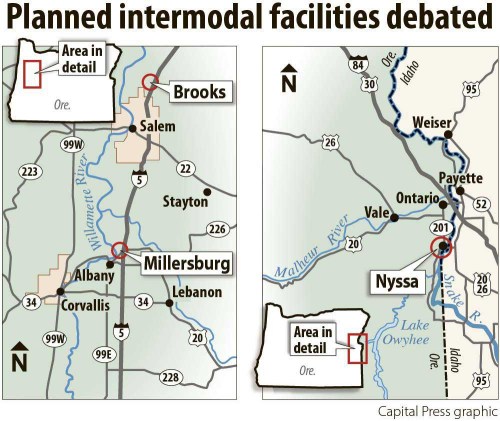Oregon intermodal proposals face further scrutiny
Published 10:00 am Friday, June 21, 2019

- Planned intermodal facilities
SALEM — Oregon transportation officials are currently leaning against funding truck-to-rail intermodal projects aimed at improving agricultural exports from the Willamette and Treasure valleys.
However, the Oregon Transportation Commission has postponed making a final decision on the proposals for another month to give sponsors more time to answer questions in detail.
Trending
Information gaps about the financial sustainability of the intermodal facilities are currently too large to commit $25 million to either of two competing proposals in the Willamette Valley or $26 million to the Treasure Valley proposal, said Matthew Garrett, director of the Oregon Department of Transportation.
“I cannot at this time recommend advancing any of the three projects,” Garrett said at the commission’s June 20 meeting in Salem.
Rather than reject the proposals outright, the commission voted unanimously to extend the decision-making process until its next meeting on July 18, when more specifics about rail prices and service are expected to be available.
“I’m not looking for certainty but we need more confidence that it will be viable,” said Tammy Baney, the commission’s chair.
Oregon lawmakers authorized ODOT to spend $51 million on the two facilities in 2017, but an independent transportation consultant has since found that all the proposals face substantial challenges in operating without subsidies.
“None of these projects really control their own destiny,” said Dan Smith, principal of the Tioga Group consulting firm. “Neither yet has a viable business plan.”
Trending
The intermodal facility serving agricultural shippers in the mid-Willamette Valley would be based in Brooks or farther south in Millersburg, with the latter proposal winning tentative support from an ODOT review committee earlier this year.
Both proposals intend for farm products, such as straw and seeds, to be shipped by rail from the mid-Willamette Valley, allowing trucks to avoid traffic in Portland on the way to marine ports along Washington’s Puget Sound.
The Treasure Valley site would allow onion producers to load their containers directly onto railcars in Nyssa, rather than trucking them to an intermodal facility in Eastern Washington, which is meant to reduce transportation costs while boosting the region’s economy.
The Tioga Group found that proponents of the Treasure Valley site may have been “overly optimistic” about how much volume would move through the facility, while the competing intermodal proposals in the Willamette Valley would have trouble operating profitably without subsidies from ocean carriers.
Currently, ocean carriers subsidize similar intermodal facilities in Portland by effectively paying for empty containers to be moved to those sites, according to the Tioga Group.
“It appears ocean carriers have been reluctant to extend that subsidy south of Portland,” said Smith, the company’s principal.
Before the commission decided to delay its decision, supporters of all three proposals touted the feasibility of their projects.
“It’s our chance to hit a home run and we’re trying to hit a grand slam, not just a home run,” said Larry Wilson, a Malheur County commissioner who supports the Treasure Valley project.
Kevin Mannix, a main proponent of the Brooks intermodal facility, said the site would be best positioned to take trucks off the road that are currently serving an existing base of agricultural exporters.
“We are trying to take that shipping business and put it on rail,” he said.
Key information about the viability of the business plan for the Millersburg facility is proprietary, while some aspects would firm up as the project is closer to being operational, said Roger Nyquist, chairman of the Linn County Board of Commissioners.
“You can’t have actuals until you actually do business,” he said.
Due to concerns about the public disclosure of confidential business information, the commission asked for guidance about exemptions from public records law for the proposals.
A representative of the Oregon Department of Justice said that sensitive data would likely be covered by exemptions for trade secrets and confidential submissions.
Proponents of the projects will have until July 12 to provide additional information about specific railroad price rates and terms of service, as well as how those factors are likely to affect demand from agricultural exporters.
“Is this a service that will add value for shippers moving forward?” asked Erik Havig, ODOT’s planning section manager.









